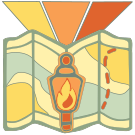Learn About Attention: Difference between revisions
→Step 2 - Learn About Non-Judgement
imported>Jacob Robertson |
imported>Jacob Robertson |
||
| Line 30: | Line 30: | ||
== Step 2 - Learn About Non-Judgement == | == Step 2 - Learn About Non-Judgement == | ||
During this step, you'll discover how often we pass judgement on what goes on around us. The example chosen is driving or commuting, but you can choose anything about your typical day that may be frustrating or boring, or mildly unpleasant in some way. Learning about judgement is the first step in learning about Non-Judgement. | |||
=== Lookouts === | === Lookouts === | ||
| Line 37: | Line 37: | ||
'''TODO''' MAKE ANOTHER, and add checkpoint | '''TODO''' MAKE ANOTHER, and add checkpoint | ||
=== Skill: | === Skill: Observe Emotions Without Judgement === | ||
{{:Observe Emotions Without Judgement}} | |||
=== Checkpoints === | === Checkpoints === | ||
* '''Emotion Observation:''' Can you identify emotions as they surface and observe them without being consumed by them? | * '''Emotion Observation:''' Can you identify emotions as they surface and observe them without being consumed by them? | ||
